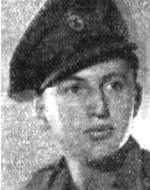Sussman, Uri (Uli)
Son of Frida and Herbert-Chaim, was born on November 13, 1921, in Berlin, the capital of Germany. He grew up and was educated in an assimilated family and attended a German gymnasium during the Nazi years. When his friend committed suicide, he was forced out of a high roof, lost his way and the German land under his Jewish legs, Uri decided to choose the Jewish way of life and honor, and in 1938 abandoned his studies and immigrated to Israel. Because of the alertness and alertness he found here during the final days of the Arab riots (assassinations from the ambush, the Wingate, the “Tower and Stockade” settlements) he abandoned the rest of his thoughts on the continuation of his studies and immediately threw himself into the stream of militant pioneering. From a youth notebook in Tel Yosef, the place of his pioneering training, he went to Ein Gev and volunteered to work on land and in the Sea of Galilee (land clearance, gravel, fishing, guarding and defense). In 1939 he completed a naval course in Ein Gev, participated in fights with Arab fishermen, and once on a tour of the mountains, his two friends were killed and he returned alone. Uri was sent to work in the Dead Sea, worked in the construction of the police station in Zemach and at the age of 18 was considered one of the best workers there. In the way of effort and sacrifice, the masterpieces of the Second and Third Aliyahs illuminated him, and he decided to follow them and to experience himself in everything, as he had with his girlfriend in life when he called her: “In order to know the country better and determine the way we go, Prepared for the lives of gypsies for several years, to know the kibbutz not from the speeches of Tabenkin and the moshav not from Shmuel Dayan’s pamphlet, but to go through the country and live it all. ” He moved to Haifa and worked in the “Magpfer” factory. At the age of 20, he was elected to the Workers’ Committee and participated in the creation of the new industry in the Gulf, and during his free time he worked in a small auxiliary farm he set up near the house. At the beginning of the Second World War, he enlisted in the Engineers Corps of the British Army, and in the Western Desert he encouraged his comrades to organize for settlement on the ground after the war. He was one of the founders of the Bnei Dror organization and after the war he went with them on the ground in their moshav in the Tel Mond bloc. When the moshav moved to Betty Bereishit, he moved to Kfar Hass. Worked hard and lovingly and saw the hard work as his “hobbies” and enjoyed his victories over the wilderness. Uri loved his life and loved many people from different countries. In his attitude toward the war and the military, he was loyal to the pacifist heritage of his father’s house and did not allow his two children to play with military-style toys, but nevertheless recognized the need to defend the Jewish presence in the country and devoted himself to security activities in Gush Katif and Labor and the Hagana. In the winter of 1948 he took part in operations, in guarding and defense, and on the night of 15.5.1948 he left without orders to bring the weapons left over to his comrades who had fallen two days earlier in an operation against the village of Tira. The village devoted itself to the revival of the neglected economy during its service, and continued to serve in the Gush. On January 1, 1949, while standing on his post in the front post of Kfar Hess, he was killed by the shots of an Arab sniper after a day of plowing and leaving plans in his farm, and was brought to eternal rest at the cemetery in Tel Mond. Ruth finishes his wife saying: “Everything stopped in the middle, the plow remained stuck in the ground and the horse was tied to a tree in the field. But the wood did not return to them “.
